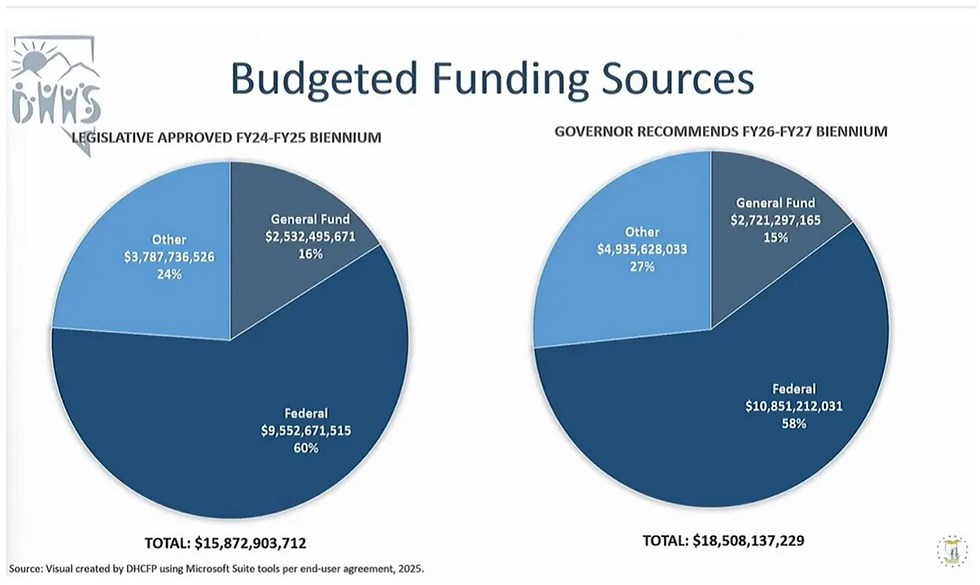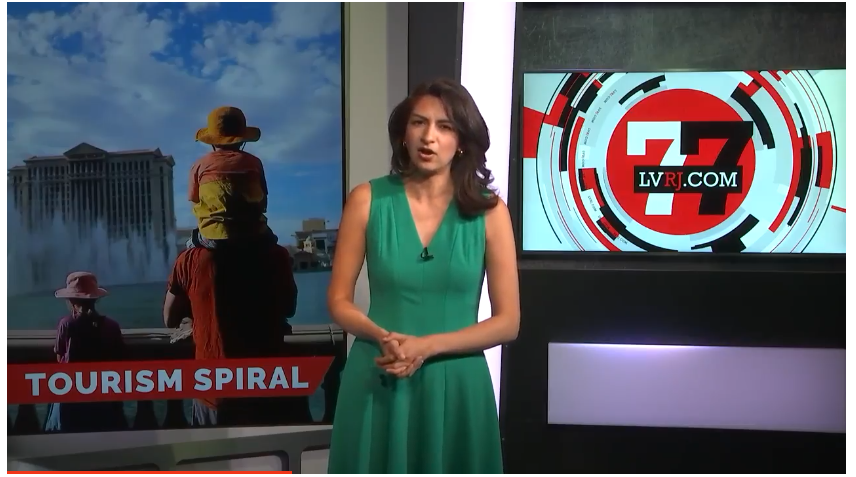KLAS: Nevada lawmakers told Medicaid cuts could mean huge budget hole, widespread loss of benefits
- Feb 25, 2025
- 4 min read
Updated: Mar 19, 2025
by: Greg Haas
LAS VEGAS (KLAS) — With a key budget hearing on Medicaid funding scheduled on Thursday, Nevada lawmakers worked Wednesday in Carson City to be prepared if federal cuts pose a threat to the state budget.
Republicans say that talk of cuts is premature and the difference can probably be made up at the federal level by eliminating fraud. But Democrats say Medicaid cuts would affect state programs.
Nevada Medicaid spending adds up to about $15 billion from the state budget over the course of the next two years — the largest part of the state budget. If the Trump administration decides it’s not going to pay as much as the federal government has in the past, states would have to make up the difference.
Gov. Joe Lombardo’s office issued a memo just before lawmakers convened summarizing some of the potential costs to the state. Medicaid currently covers 800,000 Nevadans.
“While the situation at the federal level remains fluid, and federal funding decisions ultimately rest with the Administration and Congress, I want to assure Nevadans that I am actively engaged in conversations with the White House and others in the federal government to relay our state’s concerns,” Lombardo said in the memo. He listed three primary areas of concern for the state:
Rolling back critical expansion population funding, which has resulted in significant gains for Nevada’s health care system, including reducing the state’s uninsured rate, which, before expansion, was the fifth highest in the nation. Beyond its role providing coverage for vulnerable populations, hospitals, clinics, and providers across the state depend on Medicaid reimbursements to sustain operations, maintain staffing levels, and invest in critical services.
Limiting federal funding with a per capita cap model is an additional area of concern that, depending on the details of the proposal, could mean anywhere from $590.2 million to $3.15 billion loss of federal funds for Nevada over the next biennium.
Lowering the safe harbor for provider taxes for hospitals would exacerbate our state’s already overworked and overburdened hospitals. This proposal would impose a major financial burden on more than 43 hospitals in Nevada. Moreover, this change would diminish Nevada’s capacity to comply with its recently signed settlement agreement with the U.S. Department of Justice for children with behavioral health disabilities.
Stacie Weeks, administrator over Nevada Medicaid in the Department of Health and Human Services, outlined how the state is relying on federal funding.
Of the 800,000 people who are covered by Medicaid, 40% are youth, 11% are enrolled in both Medicaid and Medicare, and 66% are on Medicaid because they are underemployed, Weeks said.

The amount paid by Medicaid is based on economic conditions in the state, measured by Nevada’s per-capita income. That federal share starts at 50%, and goes up depending on economic conditions. Currently, the Nevada average is 60-40. But that’s just for basic services, which cover about 500,000 Nevadans.
The nation has gotten used to a much higher level of coverage, both in the things that are covered and how much the federal government pays. But that was all put in place by the Affordable Care Act under President Barack Obama when states were given the authority to expand Medicaid. President Donald Trump threatened changes in his first term, but they didn’t happen.
Under expanded Medicaid, coverage is at a 90-10 split, and coverage extends to about 300,000 more Nevadans.

Weeks emphasized what would happen if the money that goes to medical providers as reimbursement for services is cut. If it’s not paid, it will place an enormous burden on hospitals and doctors. And it would have the deepest impact on people who are getting the 90-10 coverage under expanded Medicare.
“If you can’t fill that hole or we don’t find ways to make cuts to address it, it would impact coverage and our ability to pay medical services for that 300,000 people,” Weeks said.
The potential impact could be almost a billion dollars in the first year, and Nevada doesn’t have that kind of money sitting around.
If the 90-10 split became 60-40 overnight, it would cost Nevada $1.858 billion over two years — $988.9 million from the state’s general fund and $869 million in cuts to federal funds for provider tax and supplemental payment programs.

One way that costs could be mitigated is by putting in work requirements for people on Medicaid. That’s one of the ideas that Congress is discussing. Initial Nevada estimates suggest that could impact 70,400 to 112,600 low-income working-age adults. A total spending reduction could be $441 million to $705.6 million.
Republican Sen. Jeff Stone cautioned Nevadans not to overreact. “The sky is not falling,” Stone said in a statement released before a joint session of Assembly and Senate committees on Health and Human Services.
“This Joint Health and Human Services hearing is premature, political theatre and a waste of staff resources,” Stone said.
“President Trump has clearly stated that entitlements will not be touched, and he is going after waste, fraud, and abuse with tremendous success! Eliminating waste in Medicaid isn’t an attack, it’s a lifeline to increase care and services for our vulnerable populations and ensure the fiscal solvency of these important programs our constituents depend on,” Stone said.
“President Trump’s Department of Government Efficiency will find the savings in the system that will save the safety net’s solvency for future generations.”
But Democrats want to be prepared.
“Ultimately, the conversations that we’re going to have as legislators, we need to make a plan in terms of whatever congressional decisions are made, that ultimately can make the decisions as to what we have to cut in terms of programs,” Democratic Sen. Fabian Doñate said.





Comments